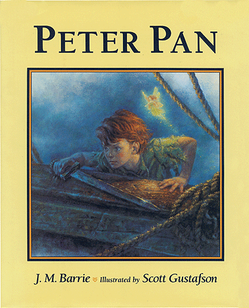Peter Pan is a sweet little fantasy about a boy who decides never to grow up and lives forever on the magic island of Neverland with his friends, playing with fairies and mermaids and fighting pirates and Indians, and also he can fly and no one ever gets hurt or has to face responsibility, right?
Not quite. Peter doesn’t exactly have friends, and he certainly doesn’t get to keep them forever.
The musical and film adaptations imply that simply being in Neverland stops people from aging, and all the children who live there stay children forever unless they make the conscious decision to leave. Imagination becomes reality for everyone, and Peter just happens to be the leader because he’s charismatic and has been there a long time.
In the book, on the other hand, it’s clear that the Neverland magic only really works for Peter. He’s the only one who sincerely can’t tell the difference between imagination and reality, the only one who can’t retain memories long enough for them to make him mentally older and wiser, and he’s the only immortal. What happens when the lost boys start getting too old for his games?
Peter kills them and recruits more. Seriously.
Yes, he lets Wendy take a batch of them with her when she leaves, but that’s not his M.O. He’s not a whimsically benevolent utopian governor; he’s a full-on mad dictator who might easily have a bigger body count than anyone else on this list, considering how many lost boys he has at any given time, how narrow an age window he keeps them for, and the fact that he’s immortal.
Of course, a body count alone certainly doesn’t make a character tragic, in spite of how often they seem to go together. How about a tragic backstory? He’s got one. Maybe.
When Wendy asks Peter about himself, he tells her that he ran away from home because he heard his parents discussing what he would be when he grew up, and he decided he didn’t want to. He later tried to go back to them, only to see through a locked window that they’d had another child. Of course, it’s noted that with Peter’s broken memory and sense of reality, the past he believes in changes from time to time and may or may not be true.
It’s kind of like this:
Tinker Bell? Nope, no help there. Neverland fairies have short lifespans. Within a year of that whole poisoning scare, she’s dead anyway and already gone from Peter’s short memory. Even his relationship with Captain Hook is noted as simply the most recent of a long string of similar rivalries.
And then there’s his twisted romance with Wendy. Her feelings for him are clear. She tries to kiss him the night they meet, and she’s absolutely charmed by the chance to play house and be mom and dad to the lost boys with him, but even in the movie/musical world where he can offer her immortality, he still can’t give her the complete life she wants. The story is hers as much as his, and for her it’s a coming-of-age story, in which Peter plays the unenviable embodiment of the childhood she has to outgrow.
He does have feelings for her, enough so that he’s crushed when she decides to leave, but he can’t comprehend and process them without letting himself grow up too much. He can’t even separate the void he wants her to fill from the one his parents are missing from.
Yes, he gets over her, he forgets her like everything else. In the end, he flies away with her daughter, and the cycle continues, and by the way Wendy’s mother talks about him before Wendy even meets him, it’s strongly hinted that he’s had something with the girls of the Darling family for generations already, but this really isn’t any better than having to remember the breakup with just one of them.
Peter escapes adult responsibilities, but this is the life he gets instead. He gets to love and lose people, over and over, always as acutely as if it were the first time, forever.








